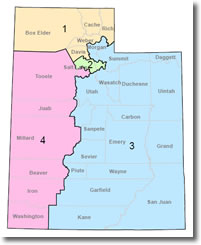
THE HILL November 29, 2006
An old Democratic friend of mine stopped by the Monocle last week and while there ran into a Democratic senator of long acquaintance. The Senator was, of course, quite pleased with the outcome of the election and is looking forward to the perks and responsibilities that go with being in the majority.The two talked for a few minutes, but the Senator was more than a little taken aback when my friend asked him what he and his fellow Democrats intend to do with the war they managed to acquire with their new majority. "What do you mean?" he said. "Iraq is Bush's war and his problem.""Oh, no," my friend responded, "it was his war until Nov. 9, but your party ran condemning the war, Bush's management of it and promised to end it in one way or another. Now, you guys are going to have to come up with a plan because you are in the majority and with the majority comes responsibility . especially on problems voters believe you promised to solve."It was a sobering thought and the senator was momentarily speechless, but then got very, very cautious and assured my friend that most Democrats believe it would be dangerous to do anything precipitous. Fortunately, there was no one from MoveOn.Org at the next table.To be fair, my friend overstated the degree to which Democrats have to single-handedly solve the Iraq problem, but voters are not likely to long tolerate their pre-election act of attacking Bush at every turn while offering nothing, or less than nothing, in the way of a realistic alternative.After all, while there was more to the election than the war, most of the 20 percent or so of those who voted and said the war was their No. 1 concern voted this year for Democrats because they don't like the way things have turned out for us in Iraq and are hoping for better.It is true that many of the Democratic Party's ideological allies and financial supporters seem to actually believe that the problem is nutcases who would pervert their religion to justify terror, torture and genocide, all on account of the U.S. They would argue, one suspects, that since it is our presence in the region that "creates" terrorists, all we have to do is leave and the problem will vanish.This reasoning may be persuasive within the fever swamps of the left, but most elected Democrats tend to be more realistic and few of them share this view of a world that would be a better place but for us. Moreover, as politicians they have to worry about what might happen if they "get us out of Iraq" and the forces we are fighting there decide to take us and our friends on elsewhere, or the Iranians and others look at the debacle there as evidence of our lack of will to oppose whatever it is they decide to do with their nuclear weapons once they develop them.Some of them are hoping former Secretary of State Jim Baker's Iraq Commission will save their bacon as well as Bush's by coming up with a magical strategy and end game that will both work and satisfy their base. That, however, doesn't seem likely given the intractability of the problem and the vehement insistence on the left that the war has to be ended now or that we at least begin withdrawing or "redeploying" troops soon.Some Democrats in Congress are already responding by rejecting the idea that anything but getting out matters. They dismiss the importance of whatever might happen there after we leave and seem to buy into the notion that everyone will be so happy that we're out that no one will blame them for "losing Iraq" or for the acts of an emboldened terrorist movement.Others are trying to satisfy their base by suggesting that all we have to do is seek support from our allies or the U.N., as if the Bush administration hasn't tried. Still others suggest that we do more to "train" the Iraqis but blanch at the thought that this course could require committing more U.S. forces, at least in the short term.And then, finally, there are those who denounce the Bush administration's "imperialist empire-building" on the one hand, while suggesting that what "we" ought to do is sit down and redraw the map of the Middle East along more "rational" lines.The lack of any unified Democratic stance on a crucial national security and foreign policy issue - on which the party's candidates ran and won control of Congress - means that my friend is at least partially right.Iraq is many things, including a tar-baby that congressional Democrats are going to find as difficult to get away from as the Republicans they so gleefully beat up over the last few years.
David Keene is the chairman of the American Conservative Union and a managing associate with the Carmen Group, a Washington, D.C.-based governmental-affairs firm.







